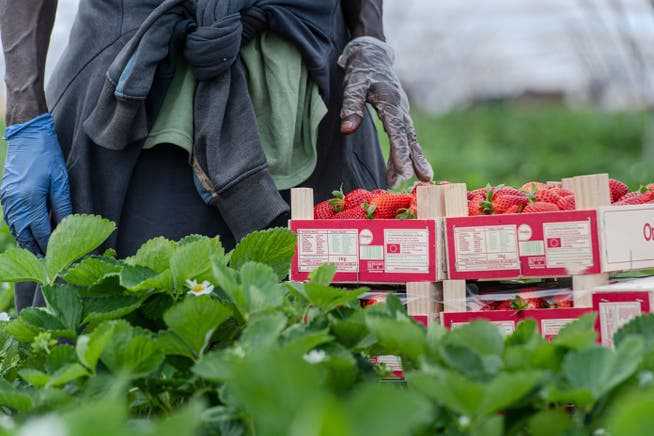European food companies are demanding the closure of illegal crops in the Doñana nature reserve. Migros is also demanding more sustainability.
One of the plastic tents surrounding the Doñana Natural Park in Huelva, Andalusia. Consumers and environmentalists criticize the high water consumption, the sometimes still existing pesticide pollution and the high plastic consumption required for cultivation.
For decades, the Andalusian province of Huelva has been supplying the European market with large red strawberries, which traditionally herald the end of winter. Huelva is considered the orchard of Europe, raspberries and blueberries also thrive here under plastic tents. 80 percent of the harvest is exported and offers the farmers a good income.
But the million dollar business has fallen into disrepute. Europe’s consumers are beginning to worry about the sustainability of growing the fruit in this province, which is said to be the world’s largest producer of strawberries.
National Park is drying up
The reason for this is the Andalusian regional government’s plan to legalize 1,900 hectares of illegal strawberry fields now. They are fed from wells that have continuously lowered the groundwater level of the Spanish national park and UNESCO World Heritage Site Coto de Doñana in recent years.
The wetland on southern Spain’s Atlantic coast plays an important role as it is a refuge for millions of migratory birds that come from northern Europe to winter here. But the national park, founded in 1969, has not only been threatened by drying out in recent years due to extremely low rainfall. The illegal strawberry fields and wells – the environmental organization WWF speaks of more than a thousand – in its immediate vicinity do their part to speed up the process.
In a letter to the Andalusian regional president Juan Manuel Moreno, 23 large European food companies, including the Swiss Migros, are now demanding that the planned legalization of 1900 hectares be stopped. “We are concerned that the proposed change not only jeopardizes the sustainability of our supply chain, but also poses a threat to Doñana,” the joint letter, which was initiated and published by WWF, said.
In addition to Migros, discounters such as Aldi and Lidl as well as the food chain Edeka and the British Tesco also signed the letter of protest. According to a company spokesman, Migros has been purchasing strawberries from Doñana for twenty years. “A complete withdrawal from the region would not solve the problem and in our case would only punish our long-standing local partners. These partners consistently implement the required standards of Migros.»
The EU Commission is now also concerned about the uncontrolled withdrawal of water in and around Doñana. She herself had approved the last land use plan for the cultivation fields before the Doñana from 2014. At that time, 9,000 hectares were approved for berry cultivation. However, even then, the 1,900 hectares in question were not licensed.
The Spanish government is also aware of the problem. “There is simply not enough water in the Doñana for everyone,” said Spain’s Environment Minister Teresa Ribera. Strawberries from Spain have had a bad reputation for a long time. They have been criticized on social networks for their extraordinarily high water consumption of 300 liters per kilogram. Added to this are the precarious working conditions for the pickers, who work for an hourly wage of the equivalent of 8 francs.

The harvest workers are often immigrants who work in precarious conditions.
The message from the powerful supermarket chains has alarmed farmers and local politicians in Huelva. Rocío del Mar Castellano, the mayor of Almonte – with 25,000 inhabitants the largest town on the outskirts of Doñana – personally went to Seville to change the mind of the regional government: “The plan endangers our farmers and harms them.” The point is to find a balance between economic interests and nature conservation as quickly as possible, according to the politician – knowing full well that ecological concerns have never received any significant attention in her region.
Andalusian state government switches to stubborn
Almonte is home to two-thirds of Huelva’s strawberry growers, who now fear for their future if contracts with buyers in Europe are terminated.
The conservative regional government shows no insight and wants to have the so-called “strawberry plan” approved shortly with the support of the right-wing liberal Ciudadanos party and the ultra-right Vox. It doesn’t help that more than a thousand scientists have already signed an appeal to stop depriving the Doñana of its water. According to the researchers, the pressure on the nature park is alarming. Climate change and the diversion of groundwater for agriculture formed the “perfect storm”.
Her call went unheeded. In Andalusia, a new parliament is to be elected before the end of the year, and Prime Minister Moreno wants to present himself as a strong man who will not give in to environmentalists. Andalusia’s socialists don’t cut a good figure either. With a view to the elections, they only want to abstain from the upcoming vote, although the headquarters in Madrid have asked them to vote against it.
